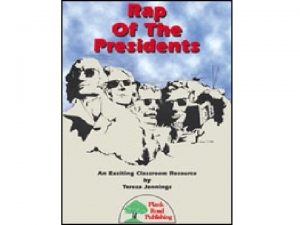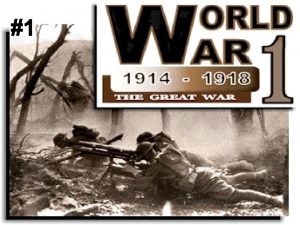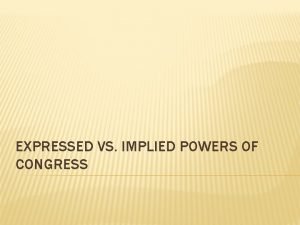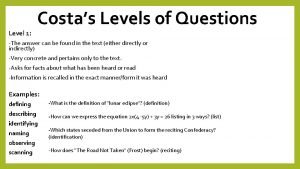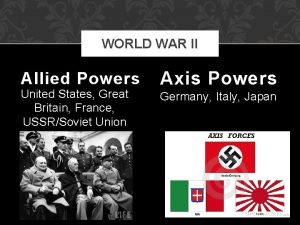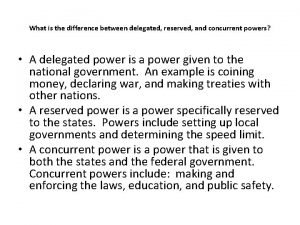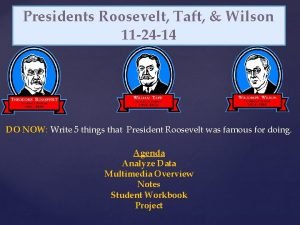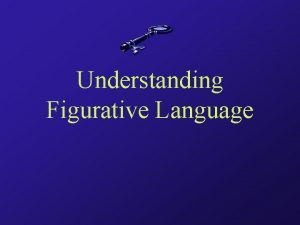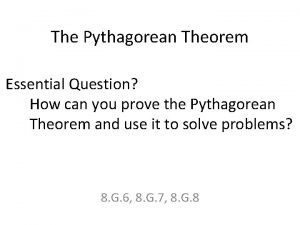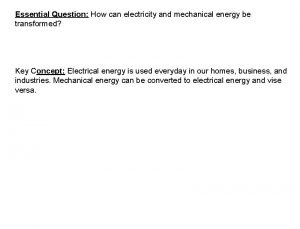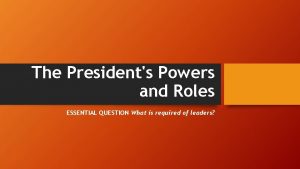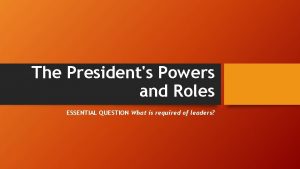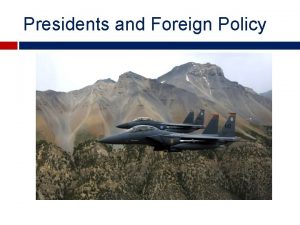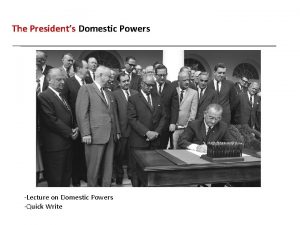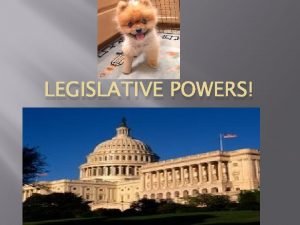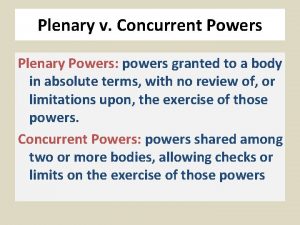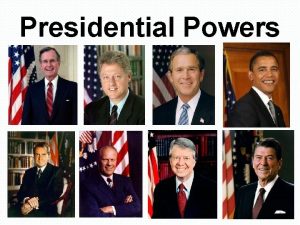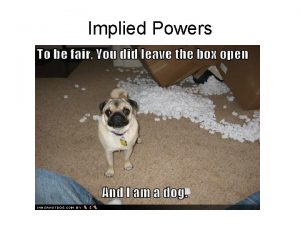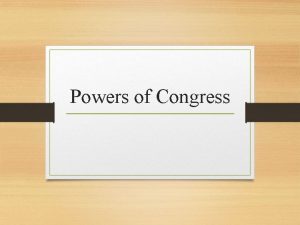The Presidents Powers and Roles ESSENTIAL QUESTION What














- Slides: 14

The President's Powers and Roles ESSENTIAL QUESTION What is required of leaders?

Presidential Powers The president is the head of the executive branch. • one of only two officials in the federal government elected by the entire nation. (Vice President) • The president is the most powerful public official in the United States. • U. S. Constitution is the basis of the president’s power. (Article II) • the president’s main job is to execute, or carry out, the laws passed by Congress.

Beyond the responsibility to carry out the laws, the Constitution gives the president several specific powers: 1. 2. 3. 4. 5. 6. He or she can veto, or reject, bills passed in Congress. He or she can call Congress into special session. He or she serves as commander in chief of the armed forces. He or she receives leaders and other officials of foreign countries. He or she can make treaties with other countries, although they need approval by the Senate. He or she names the heads of executive agencies, judges of the federal court, ambassadors, and other top government officials. These appointments need Senate approval. 7. He or she can pardon or reduce the penalties against people convicted of federal crimes. 8. The Constitution requires, or calls for, the president to tell Congress about the “state of the union. ” Each year, then, the president gives the State of the Union address. In this speech, the president discusses the nation’s most important issues and his or her plans to address them.

Presidential Roles Under the Constitution, the president is responsible for carrying out the duties of the executive branch. • As the nation has grown, the president has taken on other roles.

Chief Executive The president’s most important job is to carry out the nation’s laws. • the president is in charge of 15 cabinet departments and many agencies. • president names people to head the departments and the agencies. • Senate has to approve all of these choices. • About 3 million workers—not counting people in the armed forces—help carry out this work in these 15 departments.

Executive Order One tool presidents use to carry out the law is the executive order - a rule or command the president gives out that has the same power and force as a law. • These orders also make it possible for presidents to act quickly when they must do so. Many executive orders concern the everyday work of the executive branch. • In 1948, for example, President Harry S. Truman used an executive order to end the separation of races in the military. • This order gave Americans of all races the same opportunity to serve in the armed forces.

Justices of the Supreme Court Another power of the chief executive is to name people to serve as justices of the Supreme Court and judges of other federal courts. • Supreme Court justices decide whether a law follows the Constitution or not. • Supreme Court justices serve for life. • Thus, most presidents try to name justices who share views close to their own. • That way, they can ensure that their views continue to influence government long after they leave office.

President may also grant… Pardon - a declaration of forgiveness and freedom from punishment Reprieve - an order to delay a person's punishment until a higher court can hear the case Amnesty - a pardon to a group of people

Chief Diplomat The president leads the foreign policy of the United States. • president decides how the United States acts toward other countries. • Names people to serve as ambassadors. • Ambassadors - These officials represent the United States government in other nations.

Head of State The president is the living symbol of the nation. • he or she tries to build goodwill with other countries by greeting their leaders when they visit the United States. • president also represents all Americans at important ceremonies.

Commander in Chief • • • president is commander in chief of the nation’s armed forces. allows presidents to back up foreign policy decisions with force when they need to. The president and Congress share the power to make war. Congress has the power to declare war. Yet, only the president can order troops into battle. The entire , military follows the orders of the president. *Congress has declared war just five times. Presidents, however, have sent troops into action more than 150 times. 1973, after the Vietnam War, Congress passed the War Powers Resolution. • law says that the president must let Congress know within 48 hours when troops are sent into battle. • troops must be brought home after 60 days unless Congress approves their use or declares war. • (Since the law’s passage, however, troops have never been recalled due to congressional disapproval, nor has war been declared. )

Legislative Leader Only members of Congress can introduce bills. • But Congress expects the president to propose new laws. • Every president has goals that include new laws he or she wants Congress to pass. • The president and Congress often disagree over what laws Congress should pass. • One reason is that the president represents the whole nation, while members of Congress represent only their states or districts.

Economic Leader Voters expect the president to deal with such problems as lack of jobs, rising prices, and high taxes. • plan the federal government’s budget.

Party Leader The president is generally regarded as the leader of his or her political party. • The president helps the party to raise money.
 These are the presidents the mighty mighty presidents
These are the presidents the mighty mighty presidents Informal.powers of the president
Informal.powers of the president Causes of nationalism
Causes of nationalism Expressed and implied powers
Expressed and implied powers Level 2 questions
Level 2 questions Was the united states on the axis powers or allied powers?
Was the united states on the axis powers or allied powers? Enumerated vs expressed powers
Enumerated vs expressed powers Implied power
Implied power Concurrent reserved and delegated powers
Concurrent reserved and delegated powers Congress formal and informal powers
Congress formal and informal powers Plamatic acid
Plamatic acid Roosevelt taft wilson comparison
Roosevelt taft wilson comparison Questions about figurative language
Questions about figurative language Essential question for pythagorean theorem
Essential question for pythagorean theorem Essential question generator
Essential question generator
